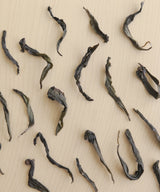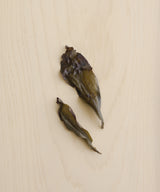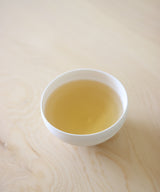Yongchun Semi Wild Old Grove Shuixian
永春抛荒老枞闽南水仙
Harvest
April 2019
Origin
Yongchun, Fujian
This is one of two very special teas that comes to us from our friend Mei in Yongchun, Fujian.
Shuixian is one of the most well-known and famous Oolong varietals from Fujian province. Its origin traces to Jianyang District in the northern part of Fujian, having been discovered in the 1600’s as a varietal that made exceptionally fragrant and delicious Oolongs. It was then brought to the Wuyishan region for cultivation and production.
Nowadays, when we hear the name Shuixian, it is almost automatically assumed to be from the Wuyishan area, as a cliff oolong. So how did Shuixian tea trees go from Wuyishan, located in northern Fujian to Yongchun County, in southern Fujian?
In 1842, a local farmer from Yongchun travelled to Wuyishan to study the famous Shuixian tea and learn its craftsmanship. In 1857, he brought 100 Shuixian tea trees from Wuyishan to Yongchun, and started making his own Oolong, later named Yongchun Shuixian.
Yongchun Shuixian differs from Wuyishan Shuixian mostly in the craftmanship, the fresh leaves are less oxidized, and goes through several rounds of longer and slower roasting. Because of its unique fragrance and taste, it became very popular in the 1900’s, and thousands of tea trees were planted throughout the 1900’s.
Our friend Mei is a native of Yongchun County with deep roots and passion for the history and traditional crafts of the town and the people. Deeply touched by the groves of old tea trees covered in mosses that she saw in the mountains, she wanted to make the cleanest oolongs from these semi-wild tea trees so more people can enjoy the flavors of these traditional Oolongs with a long history.
The leaves of this specific Shuixian are foraged from a small grove of old tea trees on Yinshi Mountain, located within the pristine forests in the protected water conservation area. Yinshi Mountain is one of the highest peaks in Yongchun. The tea trees were planted in the 1940’s, and were only discovered a few years ago. Because of the very high altitude and remoteness of its location, these tea trees have been left to grow in the wild with no human intervention.
The fresh leaves are foraged by a small group of nine local villagers, and handcrafted by Mr. Liu, who is one of the most earnest and dedicated tea makers that we’ve met. The tea is slow roasted over charcoal for four rounds, each roasting accentuating the sweetness and complexity of the tea.
The resulting tea is one of the most delicious, complex and smooth Shuixian we have ever tasted. On the nose, it has pronounced orchid fragrance and mineral notes. On the palate, it is extremely complex and ever changing - notes of delicate fresh pandan leaves, stone fruit, minerals, wildflower honey and a very long lingering sweetness. This Shuixian represents the perfect example of an exceptional Oolong from Fujian when the cultivar, terroir and craftsmanship all come together.
. . .
Brewing guide
| Tea | 4g |
| Temperature |
95 °C |
| Water | 120ml |
| Steep time | 10 - 60 sec |
| No. of infusions | 10+ |
Yongchun, Fujian






